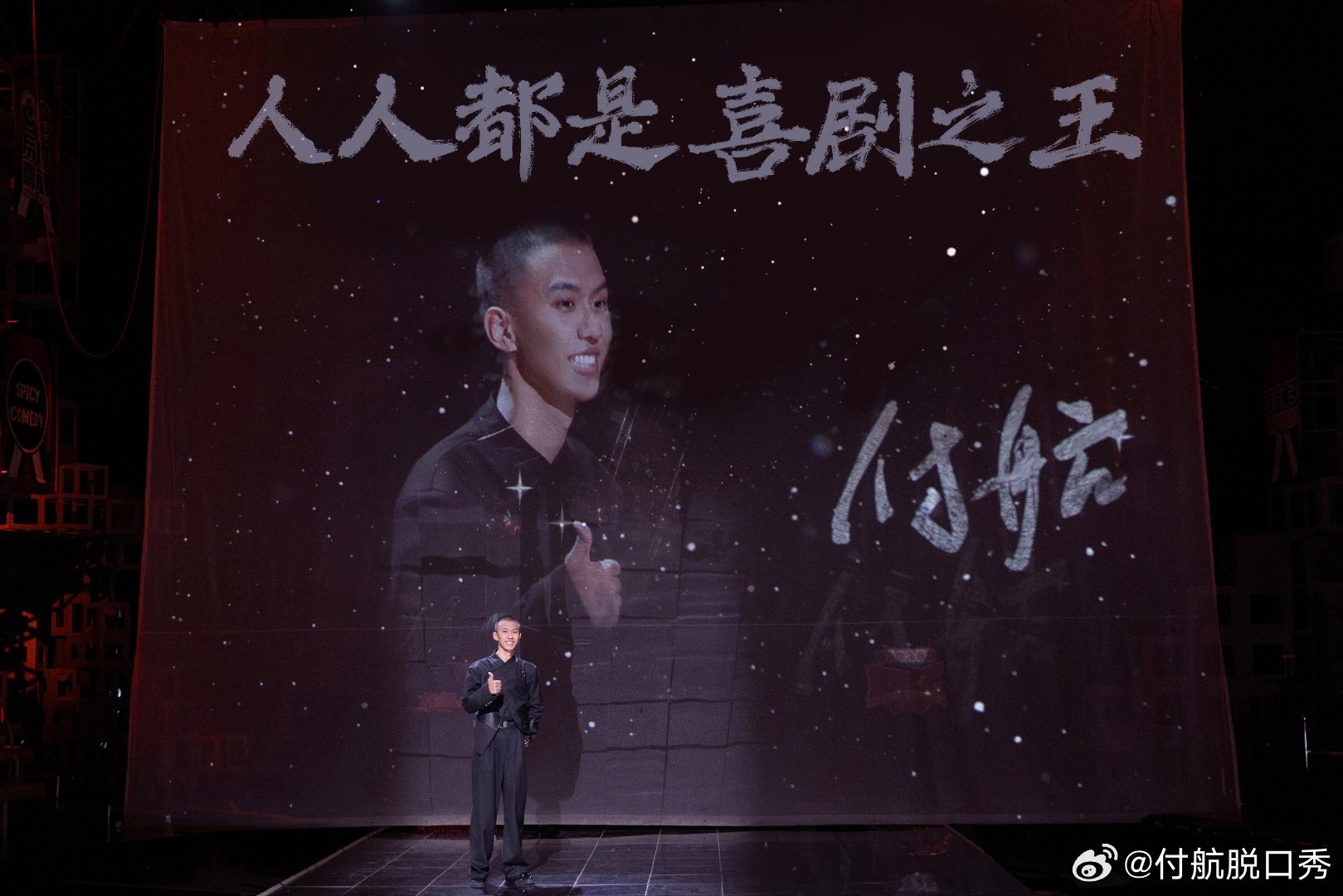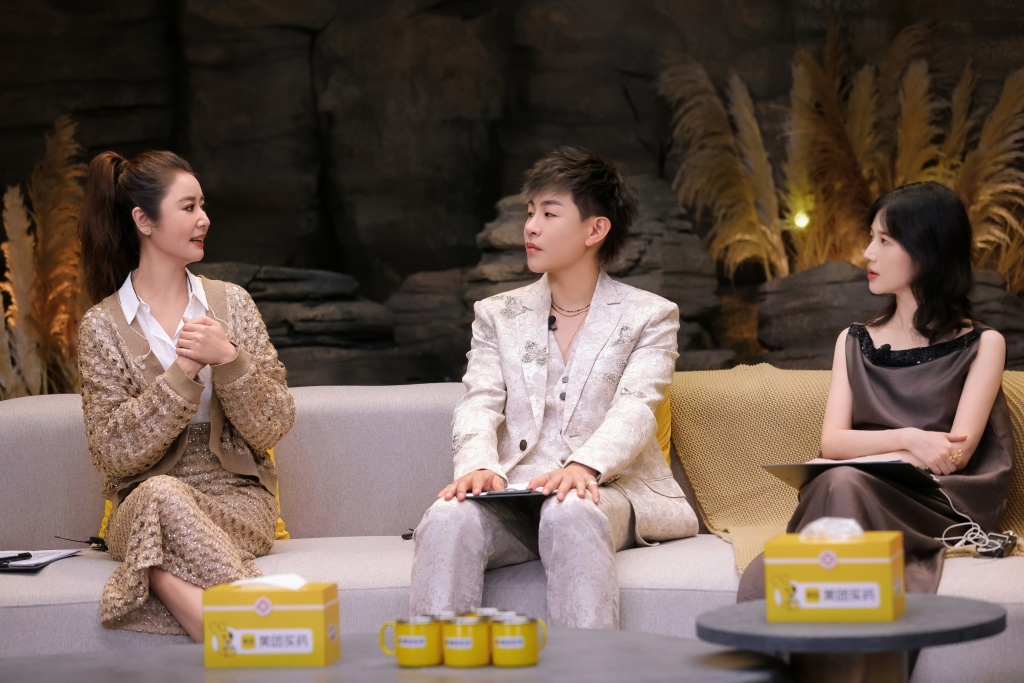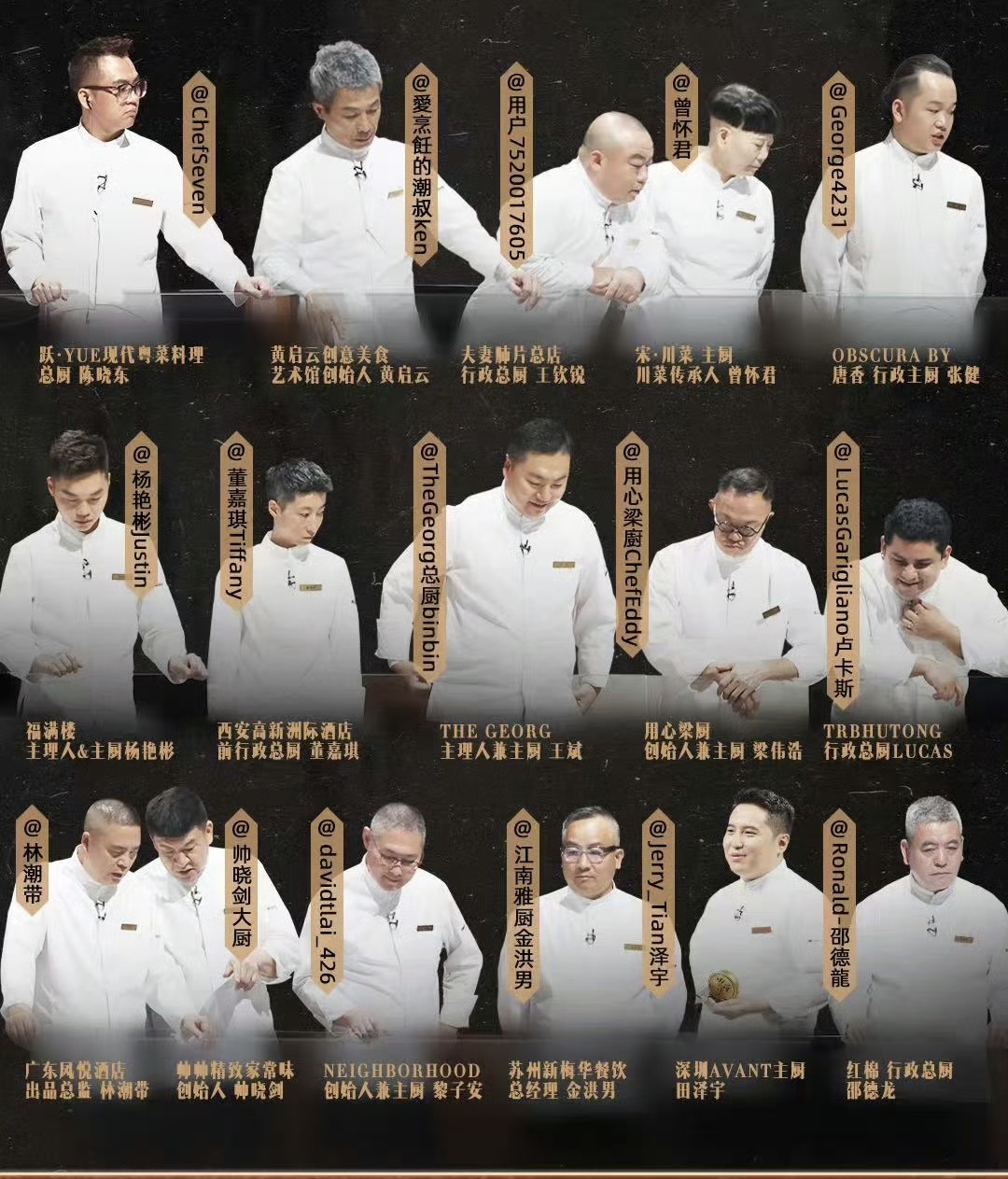
In the final episode of "The King of Comedy: Stand-Up Season," Fu Hang revealed the true essence of the "Fu Hang Show," and everyone in the audience stood up to cheer for him.
Making his debut on an online stage and winning "Da Wang," Fu Hang is a natural performer. Even when being interviewed offline, it feels like a complete stand-up comedy show, with delicate expressions, heartfelt emotions, and genuine passion! It makes you believe he is ready to lay his heart bare: this is Fu Hang.

"When I was young, I heard a story that inspired me.
"There were 100 little frogs trying to climb to the top of a tower. Half of them gave up when they reached one-third because it was too hot. Some frogs thought, 'What am I even doing this for? There might be nothing at the top,' and they gave up as well.
"At two-thirds of the way up, many frogs said, 'No frog in the world wants to do something so boring. If you want to pursue meaning, now is a good time to give up.'
"In the end, maybe only one little frog made it to the top. The reason it succeeded was that it couldn't hear the others. It was a deaf little frog, climbing up simply to see the view, wanting nothing in return, just curious about the world.
"I am that kind of person."
This was Fu Hang's response when asked if he sees himself as a "lone wolf" in the stand-up comedy scene.
1
"I could find some of your videos a long time ago," the reporter said.
"Did you like them?" Fu Hang asked.
"Of course," the reporter replied.
"Screenshot it and send it to the group," Fu Hang said.
…
Fu Hang is among the first wave of stand-up comedians who shared offline performance videos online. On September 28, 2019, he publicly released a 30-second clip of his performance, choosing jokes suitable for spreading on the internet, and he actively interacted in the comments section. That was also when the stand-up comedy industry began to rise significantly.
Initially, he gained some popularity through content well-suited for internet sharing, accumulating hundreds of thousands of fans. After that, he started posting improvised segments, and these videos spread quickly, gaining fame rapidly. This was also due to his interaction with the audience, making them a part of the performance. Every line and reaction became spontaneous, with some audience members naturally funny, while others engaged in humorous back-and-forth conversations with Fu Hang.
It's common for stand-up comedians to interact with the audience before a formal performance. In the early days, Fu Hang struggled with interaction and would only perform his segments. The hosts who went on stage before him varied greatly in their ability to energize the crowd, and not everyone could create an atmosphere conducive to storytelling. Fu Hang felt that the lack of energy was uncomfortable for both him and the audience, so he decided to warm up the crowd himself, thinking, "No matter how cold it is before me, I need to get on stage and get everyone excited before continuing with my jokes. This also helped me develop my improvisational skills."
By early 2020, his segments with audience interaction led to a gradual surge in viewership, and he didn't even need to promote "Fu Hang Stand-Up" as people spontaneously found his videos.
"When I first started posting videos, many people told me not to do it. There were even a lot of people telling me, 'Fu Hang, if you share this kind of stuff, no one will watch it.'" He hesitated to join stand-up comedy variety shows earlier because of fears someone might say, "Fu Hang, you’re just good at offline performances. Once you go online, you'll show your true colors."
Fu Hang calmly explained that during his first few years in the industry, he didn't have clubs or companies to support him; he was doing it all on his own. He felt like the deaf little frog, a lone wolf in the realm of stand-up comedy.
"It’s not that impressive; I was sharing videos simply because I wasn't performing at the time," Fu Hang quickly debunked that seemingly cool persona.
At that time, without performances, he had to brainstorm ways to attract people to watch him, to show club owners his unique merit. Once his videos started getting more likes, clubs began reaching out to him.
In one of his bits, Fu Hang shared that when he was in first grade, he was called "stinky dog poop," prompting a painful exclamation of, "Don't call me that!" By ninth grade, he could joyfully respond, "Grandpa is here!"
Now, he doesn't feel the need to validate himself anymore, saying, "Maybe it's because I’m older and have given up on proving myself."
"As I age, it seems that the importance of family, friends, and things I can easily reach has grown, while I increasingly care less about other aspects. I’m not so worried about not performing well, nor what others say. Now, I just genuinely want to share my content with the audience that has always supported me. My content is simply about pure joy. The audience can enjoy it as stage comedy without overthinking it. I’m prepared to take an early exit if necessary. I can accept anything."
Regardless of Fu Hang’s performance state or these words, he appears to be the king of relaxation. His enthusiastic calls of “Passion!” and video clips have been widely shared on social media, often accompanied by the mantra, "Don’t stress, be passionate!"

2
There’s a narrative online that claims Fu Hang's message of “being yourself” amounts to toxic self-help rhetoric. They fail to see the ten years of effort that lie behind those ten minutes on stage.
Back when his videos were deemed unfunny, Fu Hang relentlessly performed offline, determined to improve to a certain level before appearing on shows, worried he would disappoint those who liked him. He didn’t give up; instead, he held himself to strict standards, judging himself and always looking for problems and reasons from within.
He wrote numerous bits; although they weren't funny at first, there was plenty of content. If the show's guests veered into another topic, Fu Hang could seamlessly connect, saying, "I also have a bit on this theme; do you want to hear it?" His motto was to serve the audience well.
However, he didn’t settle for just creating a lot of content. “In the past, I wrote quickly because it wasn’t funny. Now, I can easily craft ten hours of material in just a few days. The audience's expectations are rising. Earlier, after performing at open mics, the audience didn’t expect anything from me. They were just curious, but now many longtime fans have specific expectations for me.”
He records his performances to reflect on improvements, figuring out what to tweak for uploading. He constantly demands progress from himself, never believing that laughter is lost due to a lack of understanding among the audience.
"I'm the type of guy who tells a joke, and if you don’t like it, I switch to another. I won’t argue about why my joke is funny or not; if you don’t like it, I’ll just keep changing until you do.
"The audience has paid; my job is to make you laugh. If the audience thinks a joke is bad, then it is; I can revise it until they find it enjoyable.
"That's what I do. Why do you get to stand on stage? Theatre productions have lighting, stage design, props, and dancers to create a show, but why should you stand there alone while the audience just sits and listens? You have to work much harder and be much more remarkable to earn that right."
While he seems relaxed on stage, he feels tense at every open mic, "It's a respect for the stage; fear that the audience won’t laugh and will waste everyone’s time." He feels even more anxious during show appearances, confessing, "My heart races; I’ve never been this nervous before. The stage lights are extremely bright and flamboyant, which adds significantly to the pressure compared to regular performances."
Having told countless bits offline, any of them could suffice for recording a program, and many contestants did just that. Yet Fu Hang analyzed carefully and decided on a split of roughly one-half old bits and one-half new bits.
"The initial content was written three or four years ago, and I completely stopped performing it offline, but I believe I owe it to the audience to at least let them know who I am.
"Some of my material is quite abstract, and I won’t bring it online because it's too unique and abstract for everyone to truly grasp. I try to select jokes that align with the show’s tone, ensuring I don’t create ambiguity or discomfort."

3
However, Fu Hang insists that his efforts aren’t labeled as “effort.”
"Do you call something you love doing 'hard work'? When you love to eat, you seek food; if you love watching movies, you watch continually; if you love dancing, you dance like crazy. Is that effort? I don't think so. It’s just about joy, finding ways to make yourself a little happier. When I perform, it’s enjoyable; I don’t think about anything else. If I feel tired, I just won’t do it. I have low desires. If doing something brings immense suffering, then I definitely won’t do it."
Fu Hang maintains a healthy lifestyle, going to bed early, rising early, enjoying swimming, hiking, and watching movies. When asked if he maintains such a routine for the sake of creativity or if being disciplined leads to high productivity, he again asserts, "It's absolutely not that way!"
"First, I’m not highly productive; second, I’m not strict with myself; third, I never force myself to create."
He believes that creativity should not depend on any particular thing, that it shouldn't depend on a routine or on coffee or alcohol... creativity should only depend on "liking." "If you're someone who enjoys hiking, you might get inspired while hiking. If you love drinking, you might find inspiration while drinking. But it doesn't mean that if you don't like drinking and have two or three bottles, you'll suddenly get inspired; that doesn’t equate."
His only precondition for creating stand-up comedy is “liking it,” and he never insists on doing something like "if I don't write, I can't sleep."
“I don’t want to turn what I enjoy into an oppressive pressure. If I force myself, I might not want to write jokes next time. Stand-up is meant to entertain everyone, and I want to enjoy it too; if the work becomes miserable, I’ll stop. Writing jokes brings me happiness; it's an emotional outlet, and I’ve never found creativity to be painful.”
Not just stand-up, but fundamentally Fu Hang doesn’t pressure himself. "Your life is a performance you present to the world, and it's challenging to portray a script written by someone else; even if you do, it won't truly be you. In the end, it's just about ranking. Many things—work, art, comedy, songs—don’t have a hierarchical structure. It's just your presentation to the world; it’s essential to remember who you are."
Fu Hang faced pressure in his youth as well. Before third grade, his parents were strict "tiger parents," enrolling him in Chinese, martial arts, English, and trumpet classes—every available course. He was forced to reach Grade Nine in trumpet. When his dad asked Fu Hang what he wanted to do when he grew up, he replied, "I want to make pancakes."
“The secret for all families to shift from a moment of pain to joy is that parents realize their child isn't cut out for this.” From that day forward, his parents ceased to force him to learn anything, saying, "We aren’t expecting grand developments from you, as long as you’re intrinsically good, a decent person, and can support yourself."
Amid the plethora of classes, Fu Hang discovered he had a talent for English. Interestingly, after attending the tutoring sessions, his oral skills soared while his grades plummeted. He even once worked as a tour guide for foreign tourist groups, without ever grasping grammar. But the English classes ignited a passion within him that felt like a fire in his heart; he journeyed through life with that passion, realizing how perfectly that word aligned with his spirit.
"I might lose, and I could lose spectacularly, but I will never know fear; I just charge ahead. Come on, let me chant one for you! Passion!"


